February 2025
The global artificial intelligence (AI) in epidemiology market size is calculated at USD 894.53 million in 2025 and is forecasted to reach around USD 7,853.29 million by 2034, accelerating at a CAGR of 27.30% from 2025 to 2034. The North America artificial intelligence (AI) in epidemiology market size surpassed USD 295.13 million in 2024 and is expanding at a CAGR of 27.45% during the forecast period. The market sizing and forecasts are revenue-based (USD Million/Billion), with 2024 as the base year.
The global artificial intelligence (AI) in epidemiology market size was estimated at USD 702.70 million in 2024 and is predicted to increase from USD 894.53 million in 2025 to approximately USD 7,853.29 million by 2034, expanding at a CAGR of 27.30% from 2025 to 2034. The ability of AI to enhance the accuracy and efficiency of disease diagnosis can grow the demand of the Artificial Intelligence (AI) in epidemiology market.
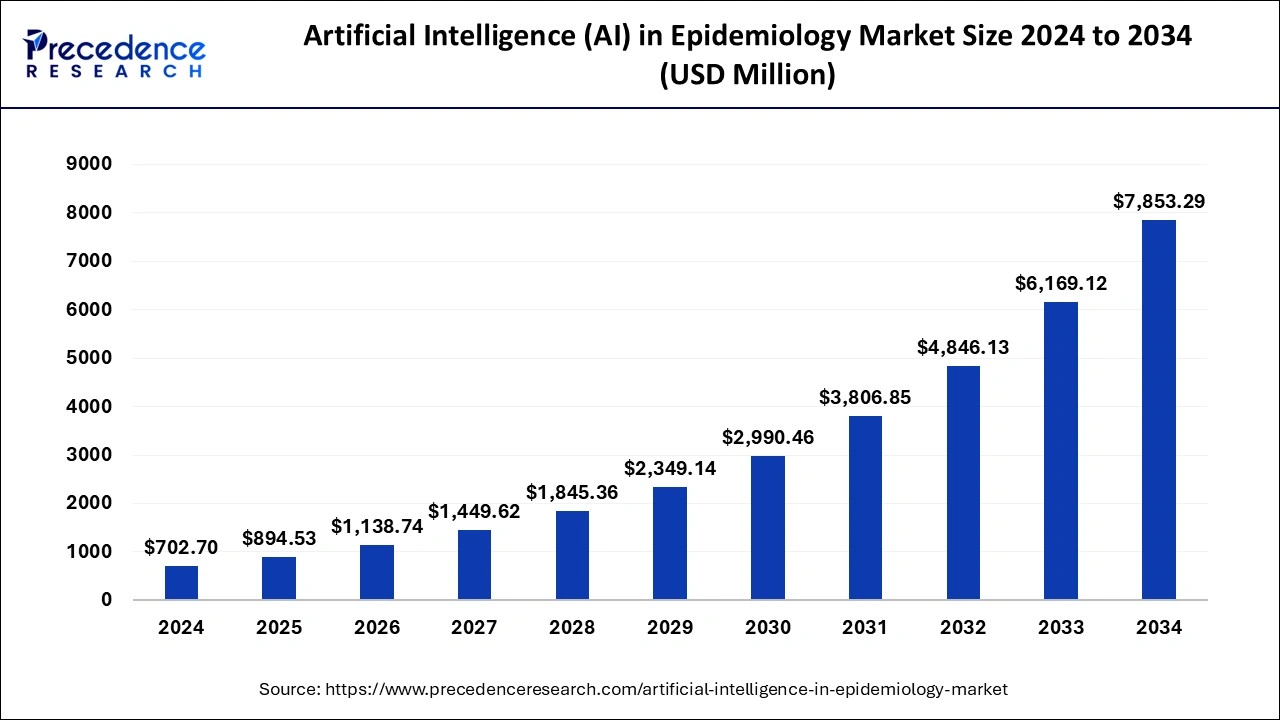
The U.S. artificial intelligence (AI) in epidemiology market size was evaluated at USD 221.35 million in 2024 and is predicted to be worth around USD 2,519.92 million by 2034, rising at a CAGR of 27.53% from 2025 to 2034.
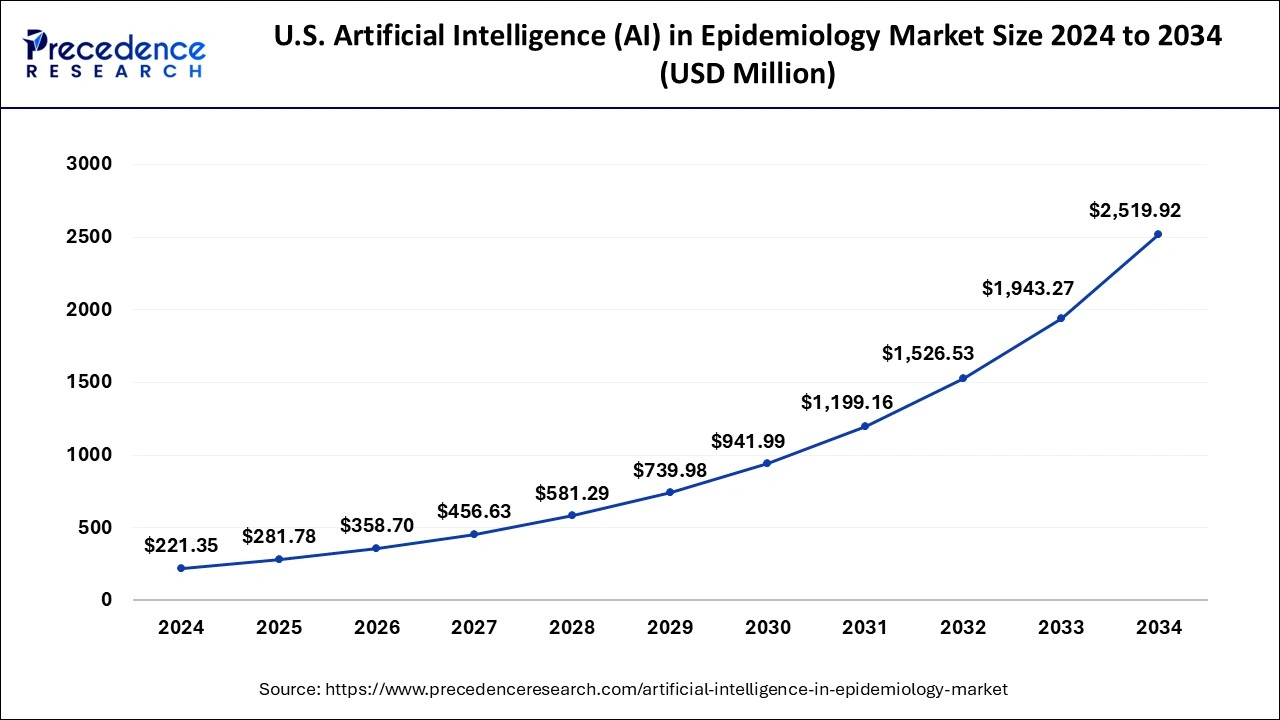
North America dominated the artificial intelligence (AI) in epidemiology market in 2024. The United States and other countries in North America have created highly advanced healthcare systems with significant investments in cutting-edge technologies. The use of Artificial Intelligence (AI) in epidemiology requires a variety of resources, including sophisticated health information systems, sizable data warehouses, and cutting-edge research facilities.
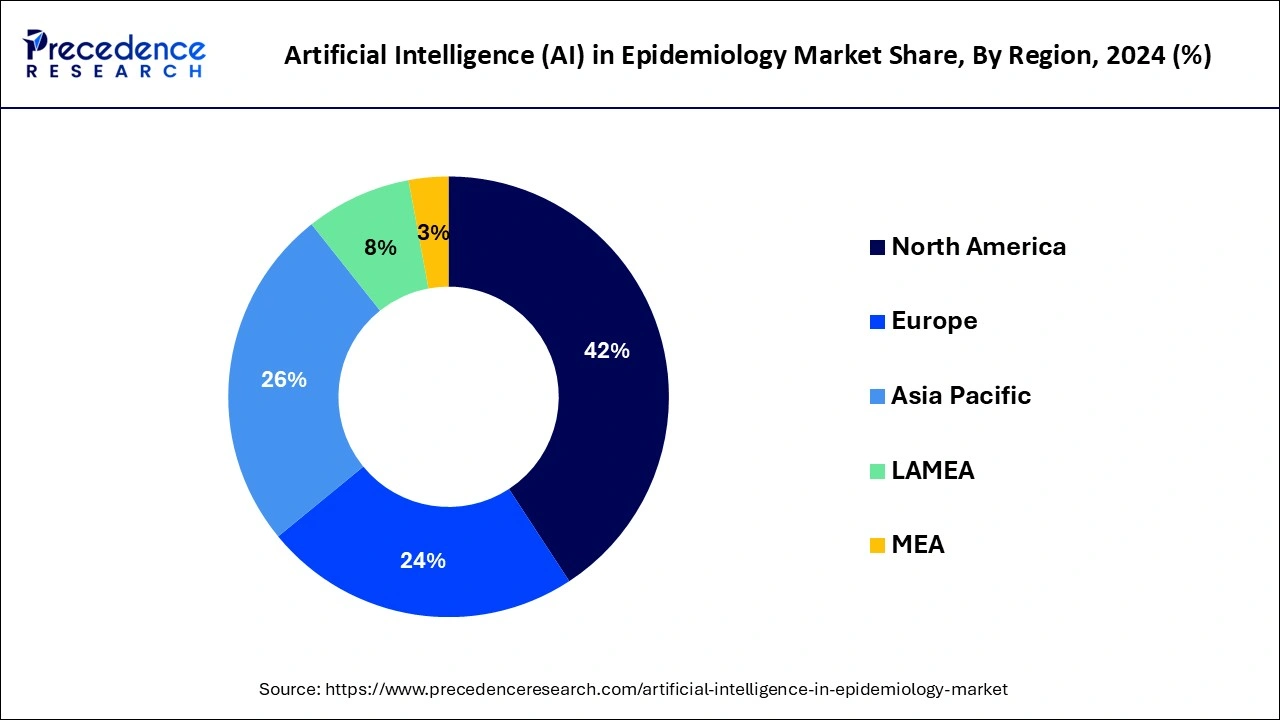
In North America, significant investments are made by both public and commercial sectors in AI and innovative healthcare. Substantial funding is provided to major tech firms, startups, and academic institutions for the development and application of AI solutions in epidemiology. These developments are also greatly aided by government programs and funding. The numerous top universities, research centers, and biotech businesses that concentrate on AI and healthcare research are located in North America. This ecosystem promotes cooperation, creativity, and the implementation of research findings in real-world settings, propelling the development of the Artificial Intelligence (AI) in epidemiology market.
Europe is expected to grow at a notable rate in the Artificial Intelligence (AI) in epidemiology market during the forecast period. The European Union (EU) and national governments around Europe are making significant investments in AI and medical projects. Significant funding is provided for AI research and development through initiatives like Horizon Europe and the Digital Europe Programme, which encourages the expansion of AI applications in epidemiology. As the involvement of their healthcare agendas.
European nations are giving priority to the transition to digital health. This involves utilizing AI technology to enhance epidemiological research, disease surveillance, and public health monitoring. Europe has a developed healthcare system, and many of its nations have cutting-edge hospitals and medical equipment. As a result, an ideal environment is created for the acceptance and application of AI solutions in epidemiology. The universities, research facilities, healthcare providers, and IT firms all work closely together in Europe. AI development and creativity are accelerated in this cooperative atmosphere.
The artificial intelligence (AI) in epidemiology market refers to the industry that uses artificial intelligence (AI) tools and methods in the study of epidemiology. The study of disease transmission, causes, and control and prevention measures is referred to as artificial intelligence (AI) in epidemiology. By utilizing complex algorithms, vast datasets, and advanced computational techniques, artificial intelligence (AI) has the potential to greatly improve many facets of epidemiology study and practice.
The artificial intelligence (AI) in epidemiology market is fragmented with multiple small-scale and large-scale players, such as Cerner Corporation, Cognizant, eClinical Works Inc, Alphabet Inc, Intel Corporation, Epic Systems Corporation, Microsoft Corporation, Meditech, Komodo Health, Siemens Healthineers, Bayer Healthcare, SAS Institute, Cardiolyse, Predixion Healthcare (Jvion LLC).
| Report Coverage | Details |
| Market Size in 2025 | USD 894.53 Million |
| Market Size by 2034 | USD 7,853.29 Million |
| Market Growth Rate from 2025 to 2034 | CAGR of 27.30% |
| Largest Market | North America |
| Base Year | 2024 |
| Forecast Period | 2025 to 2034 |
| Segments Covered | Deployment, Application Infection, End-use, and Regions |
| Regions Covered | North America, Europe, Asia-Pacific, Latin America, and Middle East & Africa |
Rising importance of artificial intelligence in public health
The rising importance of artificial intelligence in public health can boost artificial intelligence in the epidemiology market. Artificial intelligence in public health improves the efficacy, efficiency, and accuracy of disease surveillance, prediction, and management. The increased public health outcomes result from these advancements, which also raise the demand for artificial intelligence (AI) in epidemiology market.
Lack of awareness of artificial intelligence (AI) in epidemiology
The lack of awareness of artificial intelligence in epidemiology may slow down the Artificial Intelligence (AI) in epidemiology market. The slower adoption rates may result from healthcare organizations' and experts' incomplete awareness of how AI might improve epidemiological procedures. There can be resistance to incorporating AI technologies into current epidemiology operations if the benefits are not well understood.
High rate of AI technology adoption
The high rate of adoption of AI technology can be an opportunity to boost the artificial intelligence (AI) in epidemiology market. The adoption of AI technology is more rapid in the area in a number of industries, including healthcare. In order to enhance illness surveillance, prediction, and management, healthcare practitioners and public health organizations are more eager to include AI techniques in their operations.
The cloud-based segment dominated the Artificial Intelligence (AI) in epidemiology market in 2024. The capacity to scale resources up or down in response to demand is a critical feature of cloud-based systems, particularly for managing the kind of huge, changeable datasets common in epidemiology. This adaptability is especially useful for controlling peak hours during pandemics or outbreaks. The requirement for large upfront financial investments in hardware and infrastructure is reduced with cloud deployment. Alternatively, entities may utilize a pay-as-you-go framework, which offers more financial stability and facilitates more efficient resource distribution. The cloud-based systems make it possible for people in various places and organizations to collaborate by providing remote access to tools and data. This is especially crucial for epidemiology, as tracking and controlling disease outbreaks requires global collaboration and data sharing. The large-scale epidemiological data processing, management, and storage are made possible by reliable cloud solutions.
The web-based segment is expected to grow at the highest CAGR in the artificial intelligence (AI) in epidemiology market during the forecast period. In the absence of the requirement for specialist hardware or software installs, web-based solutions make it easier for consumers to use AI tools since they can be accessible from any device with an internet connection. The user-friendly interfaces of many web-based programs facilitate the navigation and efficient use of AI technologies by epidemiologists and public health professionals. Because they don't require as much hardware and infrastructure as on-premises systems, web-based solutions usually demand less initial investment. Due to their pay-per-use or subscription business structures, many web-based platforms are more financially accessible to businesses of all sizes. The time it takes to begin taking advantage of AI capabilities is shortened by the ease of deployment and instant usage of web-based solutions. Automatic updates are often applied to these solutions.
The prediction & forecasting segment dominated the artificial intelligence (AI) in epidemiology market in 2024. With the goal of detecting any outbreaks early and taking prompt action to stop widespread illness, prediction and forecasting technologies are crucial. Precise forecasts aid public health authorities in anticipating and lessening the effects of infectious illnesses, guaranteeing more efficient use of resources and effective reaction plans. Large volumes of data may be swiftly and correctly analyzed by AI algorithms, which can then be used to spot patterns and trends that conventional approaches would miss. Artificial intelligence (AI) systems are able to interpret real-time data from several sources, giving current forecasts and enabling quick action. Predictions are more reliable and accurate when data from a variety of sources, including social media, medical records, climatic data, and travel patterns, is integrated. The AI makes it possible to conduct sophisticated simulations and modeling that take into account a wide range of parameters and scenarios, enhancing the accuracy of forecasts.
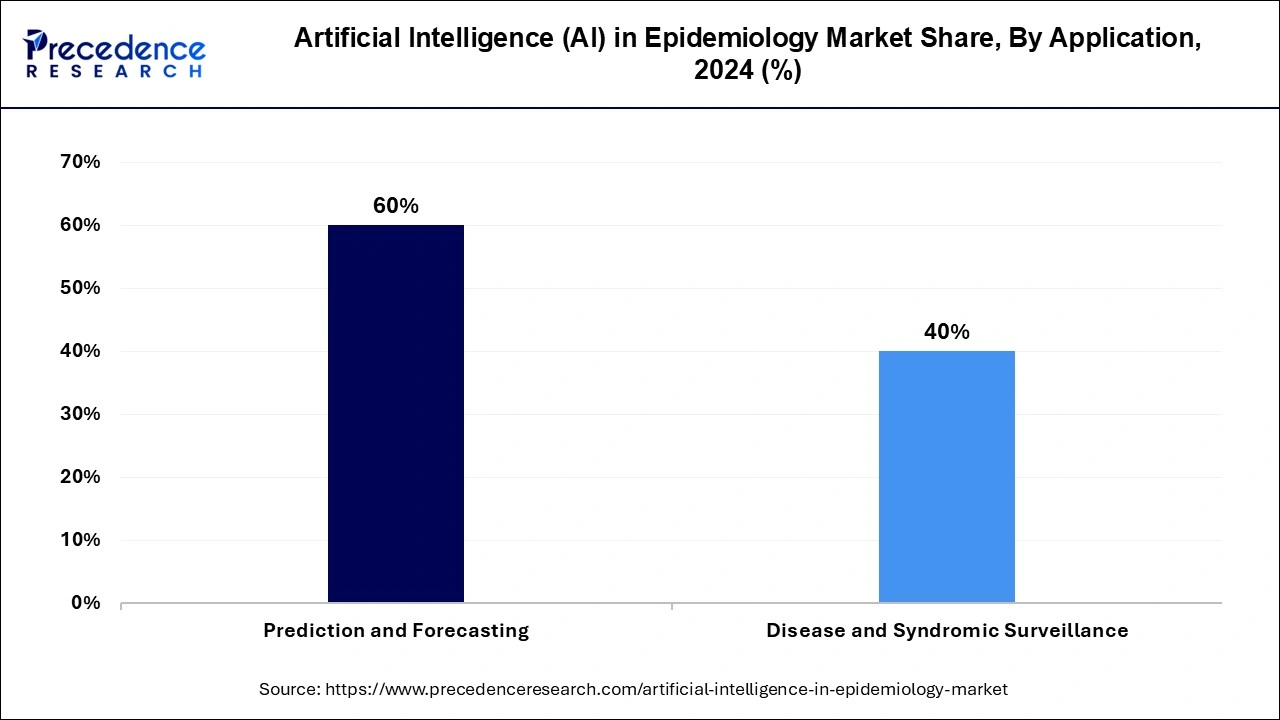
The disease & syndromic surveillance segment is expected to grow at the highest CAGR in the Artificial Intelligence (AI) in epidemiology market during the forecast period. Rapid outbreak identification is made possible by disease and syndromic surveillance systems, which track health data continually and look for unusual trends that might point to the onset of infectious illnesses. By implementing preventive measures early on, the impact on public health is minimized, and the spread of illnesses is curbed. The capacity to analyze complicated and massive datasets in real time has been greatly improved by developments in AI and machine learning algorithms, increasing the precision and effectiveness of surveillance systems. The various data sources, including travel information, social media, environmental data, and electronic health records, are integrated to construct a complete monitoring system that can identify early indicators of disease outbreaks.
The pharmaceuticals and biotechnology companies segment dominated the artificial intelligence (AI) in epidemiology market in 2024. Companies in the biotechnology and pharmaceutical industries make significant investments in research and development (R&D) to find and develop new drugs. By evaluating enormous volumes of data to find promising drug candidates, forecast results, and enhance clinical trials, AI speeds up these procedures. These businesses forecast illness outbreaks and comprehend disease development with AI-driven predictive analytics. This capacity allows for a more rapid and focused response, which is essential for the development of vaccines and therapies for newly emerging infectious illnesses. These businesses use AI technologies to analyze large, complicated information from genetic research, clinical trials, and real-world data to help them make data-driven choices. This aids in pattern recognition, comprehension of patient reactions, and enhancing therapy efficacy. By evaluating patient data to find biomarkers and make predictions, artificial intelligence (AI) helps the development of customized medicine.
The research labs segment is expected to grow at a significant CAGR in the Artificial Intelligence (AI) in epidemiology market during the forecast period. Epidemiological studies are being prioritized more in research laboratories in order to better understand disease patterns, dynamics of transmission, and implications for public health. AI offers sophisticated methods for examining huge datasets and producing insightful analysis, which is critical for this kind of study. Research laboratories are now able to do more complex and precise epidemiological studies thanks to the quick improvements in AI technologies, such as machine learning, deep learning, and natural language processing. These tools support the modeling of disease propagation, trend identification, and prediction. The research laboratories frequently have access to a wide range of comprehensive data sources, such as genetic, environmental, clinical, and social determinants of health data. In order to integrate and analyze this diverse information and identify intricate epidemiological trends, artificial intelligence is essential.
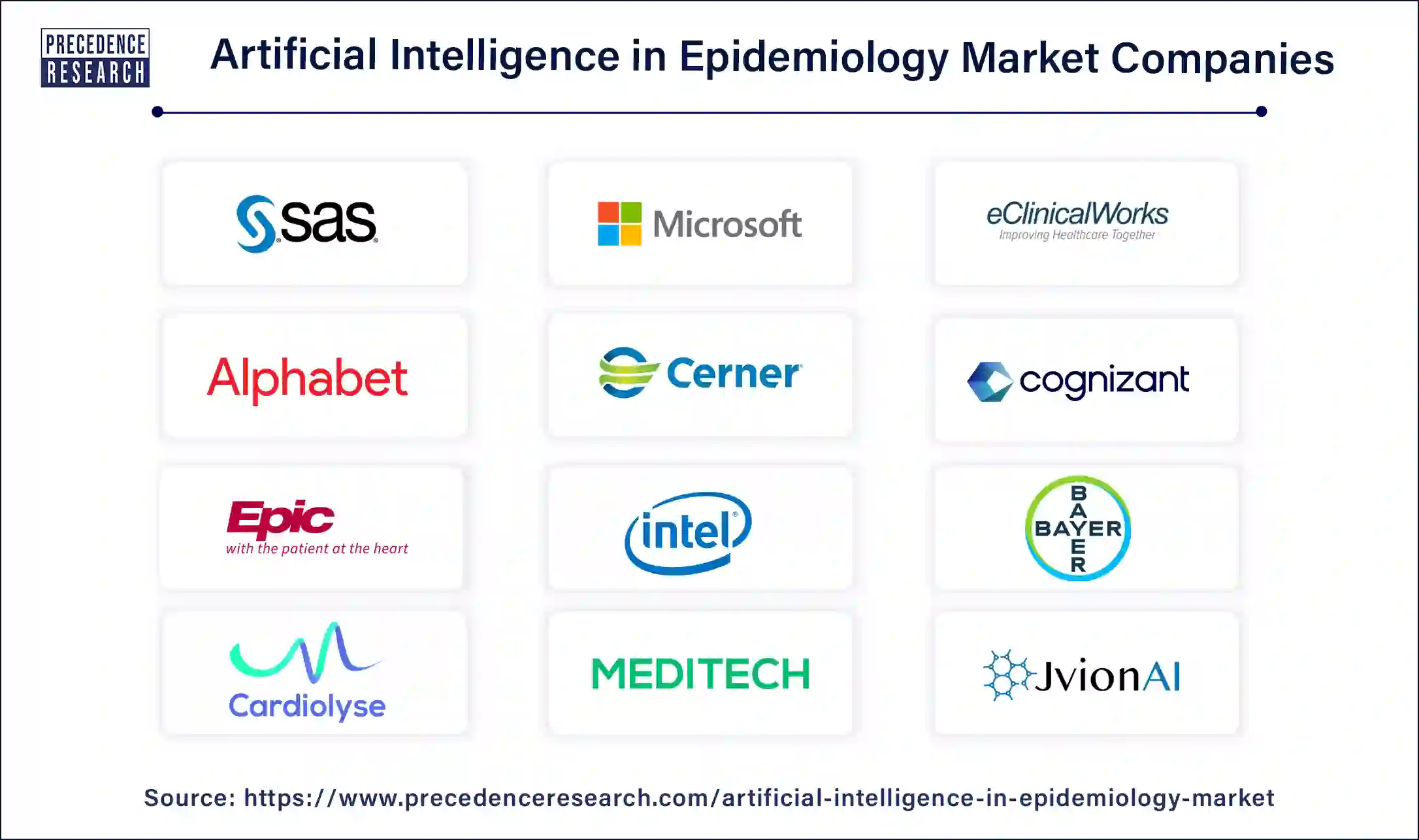
By Deployment
By Application Infection
By End-use
By Geography
For inquiries regarding discounts, bulk purchases, or customization requests, please contact us at sales@precedenceresearch.com
No cookie-cutter, only authentic analysis – take the 1st step to become a Precedence Research client
February 2025
March 2025
December 2024
December 2024